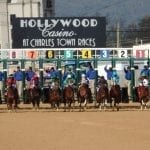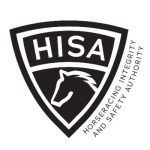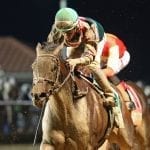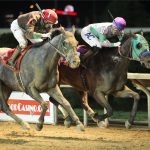Churchill Downs sees “great opportunity” at Colonial
Now is the time of year where optimism becomes defined as a horse in the starting gate. Churchill Downs officials are hoping that optimism about the company’s purchase of Colonial Downs, expected to close by the end of the year, gets ridden out well past its closing wire.
Officials with Churchill Downs spoke on Off to the Races Radio powered by The Racing Biz April 30 about expectations for their newest acquisitions in Virginia. It was the first extended public statements from the company outside of an earlier state Racing Commission meeting.
The purchase agreement also includes casino properties in New York and Iowa from Peninsula Pacific Entertainment.
Jason Sauer, Churchill’s Senior Vice-President of Corporate Development and Hunter Rankin, Churchill’s Senior Director of Racing, spoke about a rosy – err, make that Rosie — future in Virginia.
Sauer explained that the purchase allows Churchill “to buy in some existing great opportunity, great facilities, both on the racing side and the gaming side.”
A Virginia law passed in 2018 allowed allows for the deployment of up to 5,000 historic horse racing terminals, which closely resemble slot machines. It also linked HHR to racing days, with the licenseholder – Colonial Downs – required to operate a day of live racing for every 100 HHR terminals.
In March of 2022 only, Virginia HHR handle was just shy of $340 million through 2639 machines.
“It also allows us the opportunity to continue to grow and build with some gaming facilities across the state of Virginia,” continued Sauer. “The way that gaming and racing complement each other is really just perfectly suited for where we are as a company and what we get excited about. We think we can operate some first-class facilities well and continue to grow them and build additional facilities on top of that.”
Kentucky’s operational model is similar to Virginia’s in binding the number HHR terminals to live racing days, Sauer said. HHR were first deployed in Kentucky in 2011. In February 2022 more than 5,500 machines in Kentucky generated gross handle of almost $575 million.
Rosie’s locations that include HHR terminals are in Richmond, Hampton, Vinton (outside Roanoke), Collinsville (near Martinsville), Dumfries (in Northern Virginia) and the Colonial Downs track location in New Kent.
- Charles Town: Latest jockey and trainer stats
 Which Charles Town jockeys and trainers are having a good meet? Who’s doing better than you’d think? Or heating up now? Answers within.
Which Charles Town jockeys and trainers are having a good meet? Who’s doing better than you’d think? Or heating up now? Answers within.
“We get to take the baton and run with it,” Sauer said. “We’re excited about where we can continue to build more of those facilities that are both successful as standalone gaming properties and the way that the statute works in Virginia as a partnership between the racing industry, as more of the facilities are built, they’re successful. We’re very confident in our ability to continue to push that growth, it’s going to continue to be better and better for the racing industry for the racing product, the number of race dates, that’s what we’re going to bring to the table.”
Inside Kentucky, things are rolling. Purses were raised from $6 million to $10 million at Turfway Park over the winter and the spring meet at Churchill Downs opened up last Saturday with $120,000 maiden purses and the biggest stakes program in Churchill’s history, according to Rankin.
“We see the same opportunity from a racing perspective in Virginia, where the Colonial Downs meet sits in the racing calendar as it relates to the CDI group of properties,” added Rankin. “It fits really, really, nicely into the calendar in that kind of late summer spot. As the racing product continues to grow and continues to be enhanced by the HHR model, you’re going to see higher and higher demand for those stalls at Colonial. I think that’s going to going to continue to grow this year and on to the next. I think the model in Virginia is the is the big, exciting opportunity for us.”
Inside the rails, Churchill really likes what it sees. The quality of the turf course has been discussed over the years; the safe and fair dirt course was a pleasant surprise to Kentucky horsemen, many of whom came to Virginia last summer with Churchill Downs rebuilding its track.
“The dirt course there is actually very underrated. People think of Colonial Downs as a strictly a turf facility because it’s been known for the grass for so long, but that dirt track is as good as there is,” Rankin said. “Because our dirt track at Churchill was closed last summer, a lot of our horsemen were forced to disperse out, and a lot of those guys, Dallas Stewart and Bret Calhoun and a bunch of guys, ended up going to go into Colonial for the summer. They raved about that dirt track to train on and run on. So it’s a great facility and one that can run a lot of different distances and variations, especially with the grass course, which is definitely unique.”
With the facility and the added purse money, Rankin said he is looking forward to developing a blueprint for the future of racing at Colonial Downs.
“We’re going to create a real unique program and I think it’s something that the state of Virginia is going to be proud of. I think the horsemen are going to be happy with what we do. We’re going to work with them,” continued Rankin. “I think we’re going to build something special.”
“We’re really just focused on the opportunity here,” Sauer added. “As we do the work on the gaming side and continue to chase the historical horse racing opportunity in the state, that’s going to allow us to get out to 50 days and do some of the things that Hunter talked about improving the racing product.”
Colonial’s longest meet previously was 45 days. With 5000 terminals operating, the company would be on the hook to run 50.
“It’s going to be a gradual climb,” Hunter said. “I think it’s been a gradual climb for the last the last few years.” Since the beginning of historical horse racing in Kentucky, Sauer and Rankin have seen the impacts on horse racing in under and outside Churchill’s umbrella.
- Middleburg Spring Races kick off major Va. jump season
 Champion Snap Decision looks for his fourth Temple Gwathmey win as the Middleburg Spring Races kick off Virginia’s jump season Saturday.
Champion Snap Decision looks for his fourth Temple Gwathmey win as the Middleburg Spring Races kick off Virginia’s jump season Saturday.
“If you follow it over the last 10 years, it has been incrementally better every single year in terms of the talent and horseflesh that we get,” noted Rankin. “At Churchill Downs, at Turfway Park (and) it bleeds into Ellis Park and Keeneland, this economic model allows the owner and the trainer an opportunity to have a real business model. We’re going to continue to look for ways to build the Virginia product just as we have in Kentucky. I believe that Virginia can handle 50 days of racing and can support it, and I believe that if over time if the model is built correctly, the horses will follow it. I think that that word gets around about that stuff and it’s a small community of people, and so I know they were all very happy there last summer.”
Over the years, Churchill has had, from a horseman’s perspective, mixed success. The mother track is thriving, of course, and Churchill has enhanced the product at places like the Fair Grounds and Turfway Park.
But other tracks that Churchill has owned, like Calder, Hollywood Park, and Arlington Park, are no more.
In Virginia, many hope that Churchill’s early optimism over this sale won’t deteriorate into a situation like Illinois, where Arlington Park, arguably the nicest racetrack built in the United States in decades, has closed after bitter battles. Sauer and other Churchill execs say that the Virginia model is the key to the future.
“I think it’s the model in Virginia,” explained Sauer. “Racing doesn’t work everywhere, unfortunately, and we see that around the country in different jurisdictions and that’s changed over time with the proliferation of gaming as in other forms of entertainment. Virginia is a great example of that, because they lost the racing industry less than a decade ago, but they brought it back and they brought it back because in 2018 they passed the right kind of law, and the legislation allowed for the horsemen and other industry stakeholders to work together with legislators to build a system that allowed for the right kind of investment to bring the industry back.”
Sauer credits Peninsula Pacific in leading “the renaissance of racing in Virginia.” That company purchased the track from Jacobs Investments, leading to a grand re-opening of Colonial Downs in 2019 with a 15-day meet over 5 weeks. This summer Colonial Downs opens on July 11 for a nine-week meet that offers 27 days of racing, Monday through Wednesday.
“Virginia has done it right, and they’ve allowed for the growth that has happened over the last few years, in the thoroughbred industry and beyond the thoroughbred to the other breeds in Virginia,” Sauer said.
“When the statutory framework is right, I don’t think that there’s any company that’s been more willing, over the last several years to invest in horse racing than Churchill Downs,” he noted, adding, “Just watch what we do in Virginia. We’re going to invest and we’re going to make people proud.”
COLONIAL DOWNS PHOTOS
LATEST NEWS




























